Do Horses Feel Cold? Absolutely. Just like us, horses are mammals and susceptible to chilly weather. Understanding how horses experience cold and how to protect them is crucial for their well-being. This guide will delve into the intricacies of equine cold tolerance, helping you keep your four-legged friends warm and comfortable throughout the colder months.
Understanding Equine Cold Tolerance
Horses are surprisingly adaptable to various temperatures. Their thick winter coats, efficient circulatory systems, and ability to generate body heat through digestion allow them to withstand moderately cold conditions. However, factors like age, health, body condition, and weather conditions significantly impact their cold tolerance. A young, healthy horse with a robust winter coat will fare much better in the cold than an older, thinner horse with a compromised immune system.
Factors Affecting a Horse’s Cold Sensitivity
Several factors determine how well a horse tolerates cold:
- Age: Young foals and senior horses are more susceptible to cold due to underdeveloped or weakened thermoregulatory systems. Senior horses often struggle to maintain weight, which further reduces their insulation. supplements for senior horses can help them maintain a healthy weight.
- Coat Condition: A thick, healthy winter coat is essential for insulation. Horses with clipped coats, or those who are unable to grow a full coat due to health issues, will need additional protection.
- Body Condition: Horses with a higher body condition score (BCS) have more fat reserves, which act as insulation. Underweight horses are more vulnerable to cold.
- Weather Conditions: Wind, rain, and snow exacerbate the effects of cold temperatures. Wet coats lose their insulating properties, making horses more susceptible to hypothermia.
- Health Status: Horses with underlying health conditions, particularly respiratory illnesses, are more vulnerable to cold stress.
Signs Your Horse is Cold
Recognizing the signs of a cold horse is essential for timely intervention. Some common indicators include:
- Shivering: This is the most obvious sign and indicates the horse is actively trying to generate heat.
- Hunched Posture: Horses may hunch their backs and tuck their necks in to conserve heat.
- Seeking Shelter: A horse seeking shelter from wind, rain, or snow is likely feeling the cold.
- Cold Extremities: Check the horse’s ears, nose, and feet for coldness.
- Lethargy: A cold horse may appear less energetic and reluctant to move.
How to Keep Your Horse Warm in Winter
Providing adequate shelter, blanketing, and nutrition are crucial for keeping your horse warm during the winter.
Shelter
A well-designed stable or run-in shed offers protection from wind, rain, and snow. Check out some stall ideas for horses. Ensure adequate ventilation to prevent respiratory issues. horse stable windows can provide good ventilation.
Blanketing
Blanketing provides an extra layer of insulation for horses, especially those with clipped coats or compromised health. Choose the appropriate weight and type of blanket based on the weather conditions. wool coolers for horses are a great option for adding warmth after exercise.
Nutrition
Providing high-quality forage is essential for generating body heat through digestion. Increase the amount of hay offered to horses during cold weather, as this provides them with the necessary energy to stay warm.
Do horses need blankets in cold weather?
While horses have natural adaptations to cold, blanketing can provide additional warmth and comfort in extreme conditions. Factors such as coat condition, age, and overall health influence the necessity of a blanket.
What temperature is too cold for horses?
Horses can tolerate temperatures below freezing, but wind chill and damp conditions significantly reduce their cold tolerance. Monitor your horse for signs of coldness and provide extra protection as needed.
“A well-fed horse with a good winter coat can often tolerate surprisingly cold temperatures,” says Dr. Emily Carter, DVM, an equine veterinarian with over 20 years of experience. “However, providing adequate shelter and monitoring for signs of discomfort is essential for responsible horse ownership.”
Conclusion
Do horses feel cold? Yes, and understanding how they experience cold is critical for their well-being. By providing appropriate shelter, blanketing, and nutrition, you can ensure your horses stay warm and comfortable throughout the winter months. Don’t underestimate the impact of cold weather on your equine companions, and always prioritize their comfort and safety.
FAQ
- Can horses live outside in the winter?
- What type of blanket is best for cold weather?
- How can I tell if my horse is too cold?
- Do horses need more food in the winter?
- How can I prepare my stable for winter?
- What are the signs of hypothermia in horses?
- Can horses get frostbite?
“Proper winter care is crucial for maintaining your horse’s health and happiness during the colder months,” adds Dr. Carter. “Remember to tailor your approach based on your individual horse’s needs and the specific weather conditions.”  Horse eating hay in a winter paddock
Horse eating hay in a winter paddock
For riders, appropriate clothing is also essential. Comfortable pants for riding horses will keep you warm while caring for your horse.
When in doubt, consult with a veterinarian or experienced horse professional for personalized advice. If you need assistance, please contact us at Phone Number: 0772127271, Email: [email protected] or visit our address: QGM2+WX2, Vị Trung, Vị Thuỷ, Hậu Giang, Việt Nam. We have a 24/7 customer service team.